
The upcoming CDC vote on mercury-containing preservative thimerosal in flu vaccines could finally address decades of controversy over its safety, as Secretary of Health Robert F. Kennedy Jr.’s new appointees prepare to review the evidence.
Key Takeaways
- The CDC’s Advisory Committee on Immunization Practices will vote on June 26 whether to recommend removing thimerosal from influenza vaccines
- Thimerosal is a mercury-based preservative that has been used in vaccines since the 1930s to prevent bacterial and fungal contamination
- Secretary of Health Robert F. Kennedy Jr. has long claimed thimerosal is linked to neurological disorders, though health agencies dispute this connection
- The upcoming vote follows Kennedy’s replacement of all 17 advisory panel members with eight new appointees
- Advocacy groups like Children’s Health Defense are hopeful the vote will lead to thimerosal’s complete removal from all vaccines
Mercury-Based Preservative Under Scrutiny
The decades-long controversy surrounding thimerosal, a mercury-containing preservative used in some vaccines, is coming to a head as the CDC’s Advisory Committee on Immunization Practices (ACIP) prepares for a crucial vote on June 26. The committee will decide whether to recommend removing thimerosal from influenza vaccines, potentially ending its use in the last remaining childhood vaccine where it may still be present. Thimerosal has been used since the 1930s as a preservative in multi-dose vaccine vials to prevent bacterial and fungal contamination but has faced increasing scrutiny over its mercury content.
“There is a virtually unanimous scientific consensus among the hundreds of research scientists who have published peer-reviewed articles in the field that Thimerosal is immensely toxic to brain tissue,” said Secretary of Health and Human Services Robert F. Kennedy Jr.
In 1999, concerns arose that thimerosal-containing vaccines might expose infants to mercury levels exceeding safety guidelines. This led to its precautionary removal from most childhood vaccines, though the move was not due to proven harm. The influenza vaccine remains the only childhood vaccine that still contains thimerosal in some formulations, particularly multi-dose vials. The FDA maintains there are no known health risks associated with thimerosal at the concentrations used in vaccines, distinguishing between the less toxic ethylmercury in thimerosal and the more dangerous methylmercury found in certain fish.
Kennedy’s Influence on Vaccine Policy
President Trump’s appointment of Robert F. Kennedy Jr. as Secretary of Health and Human Services has brought significant changes to vaccine policy. Kennedy, who wrote a controversial book in 2014 claiming thimerosal causes autism, has reshaped the CDC’s advisory committee by replacing all 17 previous members with eight new appointees, some with histories of vaccine skepticism. This dramatic overhaul has raised concerns among traditional public health officials who fear the upcoming vote could legitimize what they consider misinformation about vaccine safety.
“Elevating this debunked myth to national policy lends credence to misinformation, and sets the stage for other actions that may undermine vaccine confidence in the United States,” said Dr. Jeremy Faust.
The upcoming vote represents a significant shift in how vaccine recommendations are developed. Earlier this year, Kennedy updated the CDC’s COVID-19 recommendations without an advisory panel vote, altering guidance for pregnant women and children. The scheduled committee meeting runs from June 25-27, with the thimerosal vote scheduled for June 26. Noticeably absent from the agenda are previously expected votes on HPV and meningococcal vaccines, raising questions about the administration’s broader vaccine policy direction.
Activists Hopeful for Thimerosal Removal
Advocates for removing thimerosal from vaccines see the upcoming vote as a potential turning point in their long campaign. Brian Hooker, chief scientific officer for Children’s Health Defense, an organization that has long questioned vaccine ingredients and schedules, expressed optimism about the committee’s review. The group hopes this decision could lead to broader changes in vaccine formulations, emphasizing alternatives that don’t contain mercury-based preservatives while still maintaining vaccine integrity and accessibility.
“We are hopeful that the consideration of thimerosal will spark a thorough discussion that it deserves, hopefully leading to its removal from all vaccines,” said Brian Hooker.
The use of thimerosal in vaccines has already declined significantly over the past two decades through reformulations and increased use of single-dose containers. However, multi-dose vials remain important for vaccine distribution, especially during public health emergencies or in resource-limited settings. The committee’s decision will need to balance concerns about thimerosal with practical considerations of vaccine delivery and availability. Whatever the outcome, the vote represents a significant moment in the ongoing debate about vaccine ingredients and safety under the Trump administration’s health leadership.

